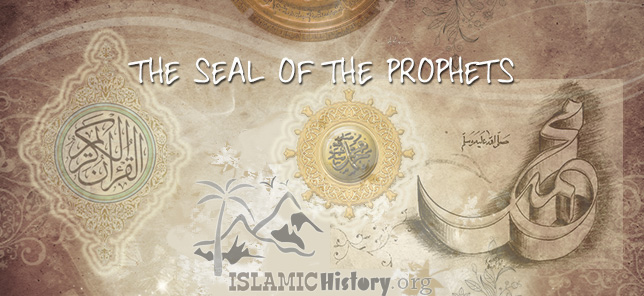To the historians, the advantage is one fact which should not be ignored when dealing with a look back at the life of the Holy Prophet Muhammed [saw]. The fact that no other Prophet, if not man, has been so recorded in history is a huge advantage in trying to learn what it is that made the personality of the Last messenger sent by Allah unto mankind so great, and so influential. However even though we have at our disposal thousands of hadith and actions of the Prophet written down from people who were privy to witness these events or sayings first hand, the goal to make a complete account of the personality of the Prophet is impossible. The fact that the wisdom bestowed upon him through the will of Allah is as great as the oceans themselves is a testament to this fact. But try we do, to elucidate others and perhaps learn from example ourselves.
This is a brief look at the Prophet Muhammed’s [saw] earlier life, his influence and the reverence generated for the ‘ mighty Arabian Teacher’ (Annie Bessant – ‘The Life and Teachings of Muhammed‘).
He was born on April 20th 570 CE (Common Era or AD) on a Monday to the tribe of Banu Hashim. His father Abdullah died before his birth and his mother when he was six years old, so he was an orphan at a tender age.
He was a shepherd who would look after the goats and sheep of others in the outskirts of Makkah. An ordinary worker doing casual labour jobs, or traveling with caravans to distant lands. He was always honest and sincere and his identity as a casual worker submerged him with other labourers and slaves. He had a noble character even at such a young age, which stood out ‘he was noble by birth but was nobler still by grace and manner’ (Abdul Waheed Khan – ‘The personality of Allah’s Last Messenger‘)
Later he adopted trade as his profession, dealing with clothes and other household goods. This took him to distant lands with caravans. He was sincere and reliable – who never spoke a lie and his people called him Al-Alim (trustworthy) and As Sadiq (One who never spoke a lie).
As a man he became aware of the evil around him, the Arabs were up to their necks in ignorance and disbelief. The Arabs instead of worshipping the One True God, as the Prophet Ibrahim (Abraham) had revealed instead took to the worshipping of idols, deities, stones, and stars. They even lacked moral principles, and tribalism was rife leading to quarrels amongst themselves. Female infanticide was common as women were seen as low and contemptible. Drinking, gambling, and religious falsehood generally prevailed. Slavery was common and in its worst form. The Prophet watched this behaviour with contempt and disgust.
Receiving Prophethood
There was much superstition and the folly of man at this time was great indeed. So the Prophet Muhammed [saw] before he received Prophethood would at times contemplate on his own, preferring to stay away from the evil around him. His search for solace leads him to the refuge of ‘Ghar Hira’ a mountain close to the city of Makkah. He would contemplate, pray, and meditate alone to Allah [swt]. At times he would do this for days and nights, and at the age of forty after two years of being alone in the mountains, Allah bestowed upon him His mercy. The Angel Jibreel (Gabriel) commanded Muhammed [saw] to ‘Read’ but the Prophet replied, ‘I cannot read’ as he was illiterate. The Angel seized him and again commanded him to ‘Read!’. The words of the Angel Jibreel to Muhammed [saw] were ‘Read! In the name of the Lord (Rabb) who has created [to the words] has taught man that which he knew not’ – 096 — Al-Alaq (The Clot) – العَلق
This was the first revelation the Prophet Muhammed [saw] received and would culminate into the Holy Qur’an, the uncreated Word of Allah [swt] after 23 years of revelation through the Angel Jibreel [alayhis]. The majesty of the Qur’an is such that it has been probed by man and there is no fault to it. It stands the test of time and at no point contradicts what we see as reality. This is the miracle of the Prophet Muhammed [saw]. Before him, Prophet Isa (Jesus, RA) had brought people back to life from the dead or the Prophet Musa (Moses, RA) had parted the Red Sea. However these miracles cannot be seen by man here, now, but the Qur’an is for all time and for all man to see in its splendour. The Qur’an remains in a state to its ‘minutest inflection’ preserved from the day it was revealed. The revelation was recorded by ready scribes and memorized to heart immediately.
As with previous messengers of Allah [swt] the Prophet Muhammed is a man and remained a man even after he received Prophethood. Allah created man and jinn to worship Him alone, as Allah alone is worthy of worship. The Prophet Muhammed had habits like any other man – he would eat, sleep, and lead his family life.
‘Wa maa Muhammed Illa-Rasool’ – No more than a messenger (33:40 TMQ)
The Messenger of Allah lived according to the Qur’an, he was the true spirit of the Qur’an. This was so that others would follow his example and because it is the way Allah has commanded man to behave. The goal was to make the companions of the Prophet [saw] and Believers adopt a way of life that was of a True Muslim.
Yaa Ayuhalazeena aamanu Aathee-ullaha wa Atheeurrasool – O you who believe! Obey Allah and obey the Messenger (47:33 TMQ)
The Personal Appearance of Muhammed [saw]
He was of medium build, physically strong, with a large head and wide shoulders and chest. He had a sun-tanned, fair complexion, his eyes were large and black with a fine, arched brow and long thick eye lashes. He had a beard up to his chest and a trimmed moustache. Over his back between his shoulders was a dark brown patch, one of the signs of his Prophethood. He used to wear a silver ring with ‘Muhammed Rasullallah‘ written on it (Muhammed Messenger of Allah). He was always absolutely clean in body and clothes he dressed humbly-he only wore expensive clothing when they were presented to him as a gift from other nation leaders as a sign of appreciation. He loved to wear perfumes and he ate little, slept little, and spoke little and never of himself. He walked briskly and his companions would find it difficult to keep up with him. His presence and gait were dignified and imposing, truthful, sincere, and unselfish – caring for others above himself. He was intelligent and with a good memory.
The foretelling of Prophet Muhammed [saw] in Other Scriptures
Wa innahu lafee zuburil awwaleen – And verily it is in the scriptures of former people’s – TMQ (26:196)
There have been scriptures before the Holy Qur’an and in them there is mention of the Prophet’s arrival. They include the Injeel (Bible), Torah (Talmud), Vedas, Pumas/Purana and Parsi scriptures. There is even mention of the Prophet Muhammed by Guatama Buddha relying to one of his students Ananda.
New and Old Testament
Torah, Book of Deuteronomy (18:15) – The Lord your God will raise up a Prophet like thee (Musa/Moses, RA) from among your brethren, and I will put My words in his mouth; and he shall speak unto them all that I command. * NB
Gospel of John (14:16) – And He will give you another Counselor with you forever
(14:26) – . . . he will teach you everything I (Jesus/Isa) have said to you
(15:26) -He will testify about me
(16:8) – When he comes, he will convict the world of guilt in regard of sin, righteousness and judgment
(16:13) – But, when he, the Spirit of Truth comes, he will guide you all into all truth. He will not speak of his own; he will speak only what he hears and he will tell you what is yet to come (16:14) He will bring glory to me by taking what is mine and making it known to you
Vedas
There is mention of a great personality by the name of Vada Mehat and Ahmedir. These are Sanskrit words that are similar to, if not the trans literal equivalent of Ahmed which is the same as Muhammed. The specific mention is found in the Bhagavad Gita, Bharishya Purana/Puma. ” Just then an illiterate man with the epithet teacher, Muhammed by name, along with companions . . . that Great Deva, the denizen of Arabia . . . O denizen of Arabia and Lord of the Holies to thee is my adoration. O thou who has found many ways to destroy the devils of the world! O pure one from among the illiterates. O sinless one, the Spirit of Truth and absolute master, to thee is my adoration. Accept me at they feet.” Parv 3 Khand 3, Adhey 3 Shelok 3-8)
Guatama Buddha said addressing one of his disciples Ananda question of who would teach them after he passed away – ” I am neither the first Buddha, nor the last”. This can be found in the Ceylon text.
Parsi Scriptures (Persian religion)
There is a clear prophecy about the arrival of Muhammed [saw] in Dasatir No.14 – it mentions a man born in Arabia who would conquer Persia (a superpower of the time of the Prophet Muhammed [saw] and destroy the idols in the house (the Ka’ba in Makkah). “. . . wise men of Persia and others will join his followers”. All this did happen with the arrival of Muhammed [saw] and Persia is now Iran, a Muslim country.
* NB – There are prophecies about Muhammed and these are borne out as truthful. There is no doubt that Allah had informed people of other scriptures about the Prophet Muhammed[saw] as the Spirit of Truth. In the Injeel (Bible) Old Testament many Christians argue that the Book of Deuteronomy (18:15) is referring to the Prophet Isa (Jesus) but it states “like me” and the Prophet Muhammed was more like the Prophet Musa (Moses) [alayhis] than Jesus [alayhis] was. The facts are that both Muhammed [saw] and Musa [alayhis] both married and had children. They both died natural deaths and their graves are on earth. They both were leaders and they both had a father and mother whilst Isa (Jesus) only had a natural mother. His birth was a miracle. Another fact is that Muhammed and Moses brought new laws and Jesus did not – Matthew (5:17-18).

